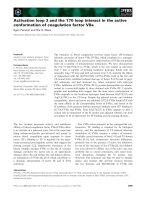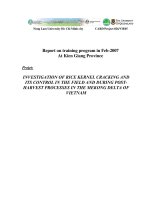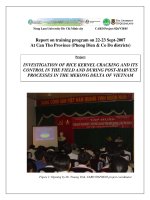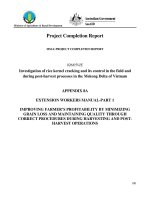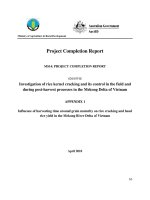“History – geography – literature – civic education and fine arts integrated teaching in an english period of grade 6 period 33 unit 5 natural wonders of the world – lesson 1 getting started
Bạn đang xem bản rút gọn của tài liệu. Xem và tải ngay bản đầy đủ của tài liệu tại đây (1.54 MB, 22 trang )
THANH HOA DEPARTMENT OF EDUCATION AND TRAINING
DONG SON OFFICE OF EDUCATION AND TRAINING
INITIATIVE IN TEACHING EXPERIENCE
TOPIC:
“HISTORY – GEOGRAPHY – LITERATURE – CIVIC
EDUCATION AND FINE ART INTEGRATED TEACHING IN AN
ENGLISH PERIOD OF GRADE 6
PERIOD 33: UNIT 5: NATURAL WONDERS OF THE WORLD
LESSON 1: GETTING STARTED.”
ENGLISH 6 SUBJECT
Written by: Mai Thi Lien
Career: Teacher
The unit of work: Dong Quang Secondary School
The initiative experience of subject: English
THANH HOA, YEAR 2019
1
TABLE OF CONTENTS
TABLE OF CONTENTS
I. INTRODUCTION
1. The reason for choosing the topic
2. Research purposes
3. Research subjects
4. Research methods
II. SOLUTION OF THE ISSUE
1. Theoretical basis of the initiative experience
2. The real situation before applying the initiative experience
3. Innovations or solutions used to solve the problem
4. The effectiveness of the initiative experience for topic
III. CONCLUSIONS AND RECOMMENDATIONS
1.Conclusions
2. Recommendations
IV. REFERENCES
Page
2
3-5
3
3-4
4
4-5
5 - 19
5
5-6
6 - 18
18 - 21
19 - 20
19
19 - 20
21
2
I. INTRODUCTION
1. The reason for choosing the topic
In the context of further international integration, English teaching and
studying are of greater and greater significance. Accordingly, a good
command of English and great success gained in puttting English in action
definitely enable you to improve your own status and position in the eye of
international friends. Generally, English is widely considered the most
popular language on the globe, at the same time it is the key to the world. For
the businessmen circle, English is regarded as the tactic for every potential
achievement. Above all, English absolutely raises its voice on every aspect of
daily life. Nowadays, it is not only a compulsory subject in educational
settings at any level, but has also been developed into an all-round critical
communicative tool. Thus, it is more increasingly important to determine
which English study approach is the most effective. In fact that once studying
approach has been mis-executed, we probably face bigger challenges in
achieving planned goals as a result. As a rule, English teaching and studying
are interrelated. In the setting of further global integration, the Vietnamese
education has been changing basically and the teachers are very important
volunteers in this, in which greater importance has been attached to learneroriented teaching. Specifically, teacher plays the role as the guider for
students during their English acquisition. In the spirit, teacher’s traditional
function, known as pure teaching performance, should be taken into
consideration. Accordingly, something should be changed. That is, there is a
demand in integrated teaching approaches in which social science subjects
(Literature, History, etc) or natural science ones (Physics, Chemistry, Biology
and Geography) are integrated into one subject. Based on it, students are
taught how to perform information, collection, processing and assessment,
therely well applying acquired knowledge to their real situations of daily life.
2. Research purposes
Integrated teaching can be performed in the scope of one unit, one
theme, or one certain period in class. In the period of in this topic, I have
made most use of inter-subject knowledge acquired in order to enable
students to well deal with physical and sport activities after school. Therefore,
the performance of the topic of study on the 33th period (Lesson 1, English 6)
is in need of inter-subject teaching involved in subjects as follows:
3
- History: Students know how to use their historical knowledge to inculcate
their understanding of time of birth; the process of building ancient wonders,
new world wonders and natural wonders of Vietnam as well as artistic values
of natural wonders, thereby helping students understand and appreciate labor
achievements and creative talents of people
- Geography: Using Geography knowledge to introduce students how to
determine the geographical location of natural wonders.
- Literature:
Studying skills about writing paragraphs or articles on natural wonders
- Civic education:
Educate students to love consciously, preserve and protect the wonders.
- Fine arts: using the Art knowledge to help students drill their imagination
and illustrate with pictures through paintings as well as see all the beauty and
values of artistic architectural masterpieces of the world's natural wonders. In
order for them to appreciate the cultural and historical values of humanity and
consciously preserve them.
- Being a teacher in the current situation, I am well aware of greater
significance of integrated teaching approach in dealing with potential
problems in each subject, thereby facilitating students to have further
understading of every aspects of the subject involved. Also, integrated
teaching helps students bring into full play their own thinking and creativity
in knowledge acquisition and application in reality. In the spirit, I would like
to express certain experiences in integrated teaching in the topic:
“History – Geography – Literature – Civic education and Fine Arts
Integrated Teaching in an English period of Grade 6 Period 33: Unit 5: Natural wonders of the world – Lesson 1: Getting started
3. Research subjects
- History – Geography – Literature – Civic education and Fine Arts
Integrated Teaching in an English
- Objective of Study includes 28 students of class 6A of Dong Quang
Secondary School, Dong Son District, Thanh Hoa Province.
- The 2018 - 2019 school year.
4. Research methods
During the teaching of the topic, I have used many methods such as:
- Methodology of theoretical research
4
- Methodology of reasoning
- Observation method
- Conversation method
- Investigation method
- Test and evaluation methods
II. SOLUTION OF THE ISSUE
1. Theoretical basis of the initiative experience.
- In the current process of national industrialization and modernization,
further internation integration is of greater significance. In the spirit, our State
and Party have reaffirmed the policy “Education is National Top Priority”, in
which English has been paid more and more attention and listed in the
compulsory educational curriculum. In fact, English is open to all learners at
any level, but it requires reasonable learning approaches and know-hows for
truly great effectiveness. In other words, how to study English well is an issue
of much interest.
- Above all, English studying requires all learners to make ultimate
self-motivation, which drive them to be patient in their practices of English
skills listening, speaking, reading and writing, at the same time determining
specific goals within a certain period of time. What is English studying for?
Just be well aware of individual goals, like foreign business communication,
abroad travelling, tourism, or overseas study, and so on. Once specific goals
have been set and determined, best English studying approaches are probably
found out. The same can be said about English teachers. Thus, integrated
teaching should be soon taken into consideration, mostly because it enables
students to precisely acquire knowledge, skills and positive attitudes, at the
same time integrating all of them into real social situations, as well as
inspiring them to learn English and lead meaningful lives.
2. The real situation before applying the initiative experience.
In fact, English teaching and studying at Dong Quang Secondary school
are facing a great number of issues, caused by certain things as follows:
- As for students and their parents:
A certain number of students and their parents are not clearly aware of
English significance. As a result, students take little interest in English
studying, while their parents pay no attention to their children’s performance
at school.
5
A contingent of students take no notice of their lessons (due to chatting;
inattention in teachers’ performance, as well as distraction caused by outersocial factors like online games, social networks and teenager tendencies, and
so on.
Also, students generally show signs of laziness and poor awareness of
self-study. They frequently forget to review lessons, do homework, and make
preparations for new classes. In addition, they fail to balance their interests in
life.
A certain number of students have lost their English background, that is
proven via the outcome of schoolyear-beginning placement test.
- As for teachers:
Regardless of numerous efforts made during their lessons, namely
diversified teaching approaches aimed at further student mobilization,
eventual results are to some extent limited. Teachers fail to apply their
favourite teaching approaches to all lessons, as well as all students. It is partly
because of overloaded coursebook content, over-sized classes, poor student
background, and poor awareness of self-improvement. As a result, the English
teaching outcome has failed to meet the demands up to now.
- As for the English curriculum:
Despite its further attraction in content, the English curriculum, in fact,
is much more difficult, therefore acts as a huge challenge to students of poor
background. Apart from it, English is in close connection with other subjects
in the over-all curriculum at secondary school level. Thus, it requires learners
a certain level of background which ensures them a relatively performance at
school. In reality, a lot of students, as a result, fail to keep pace with the
curriculum and eventually are left behind.
3. Innovations or solutions used to solve the problem.
In some cases, the allocation of English content in each period is to
some extent uneven. Some English content, that is, can’t be dealt with in just
45 minutes as scheduled. Also, time for further practice of grammar points is
in fact limited.
In face of it, teachers are forced and also driven to adjust their own
teaching approaches that are much more in line with such new situation. At
the same time, new goals are set. As a result, one of new teaching approaches
6
is taken into consideration in my topic, namely historis – geography –
literature – civic education and fine arts integrated teaching. It is as follows:
- History integration : Students know how to use their historical knowledge to
inculcate their understanding of time of birth; the process of building ancient
wonders, new world wonders and natural wonders of Vietnam as well as
artistic values of natural wonders, thereby helping students understand and
appreciate labor achievements and creative talents of people
- Geography integration: Using Geography knowledge to introduce students
how to determine the geographical location of natural wonders.
- Literature integration: Literature study enables students to get better at
expressing ideas, making speech in certain cases. Also, it creates a ground for
students to approach other subjects as well as form their own style. Literature,
therefore, is critical to individual study performance and personal
development, via improved idea expression. Thanks to it, it makes students
find it easier to translate new linguistic materials during their English lessons.
- Civic education integration: It enables students to be well aware that natural
wonders and how to conserve them. Accordingly, civic education makes
remarkable contributions to higher education and training quality, as well as
developing student into contributing members in the society, as well as welldetermined, honest and objective. Thanks to it, civic education helps students
improve their own knowledges. It drives them to lead a better and valuable
life.
- Fine arts integration: using the Art knowledge to help students drill their
imagination and illustrate with pictures through paintings as well as see all the
beauty and values of artistic architectural masterpieces of the world's natural
wonders. In order for them to appreciate the cultural and historical values of
humanity and consciously preserve them Based on it, students are developed
to be more passionate, flexible and concentrative on other subjects as well.
Last but not least, history – geography - literature – civic education –
fine arts integrated teaching helps improve teaching quality and outcome, at
the same time enabling students to find out better study approaches. In
addition, the reality shows that the performance of integrated teaching has
shown remarkable signs, like further student determination, their greater
efforts, and so on that were not available before. As expected, students have
known how to take innitiative in their own study, and got much more creative
and flexible in knowledge acquisition. Generally speaking, integrated
7
teaching helps promote student critical thinking, as well as develop into
highly professional citizens who always know how to put any situation under
control in the future.
Based on it, I would like to design certain lesson plans that I have
personally taken charge of in the Grade 6 English curriculum by taking
integrated teaching approach. In which, a set of charts, mind maps, diagrams,
as well as images of fine arts, and details of physical education and literatures
are included and made most use during my lesson. Hopefully, the best
teaching outcome is achieved in a well-prepared combination of multi-subject
qualities, thereby driving students to love studying English more, also leading
a much more beautiful life.
Detailed examination:
Creative application of history – geography - literature – civic
education – fine arts integrated teaching approach to a specific lesson in
class at Dong Quang Secondary School:
Period 33: UNIT 5: NATURAL WONDERS OF THE WORLD
Lesson 1: Getting stared
I. OBJECTIVES:
By the end of the lesson, the students will be able to use:
1. Knowledge:
- To use lexical items related to “ things in nature” . Use fixed expressions
for classroom situations.
- To get to practice in reading to seek information.
- Understand more about famous landmarks in Vietnam as well as in the
world.
- Write the passage about one of famous landmarks.
2. Skills:
As for English:
- Listening: Listen “Listen and read”..... page 48 & 49, grade 6 English
coursebook.
- Speaking: Practise the conversation activity 1 and then answer the questions
in activity 1, 2, 3, page 48 & 49, grade 6 English coursebook.
- Reading: Read in details the conversation activity 1 again and answer the
questions in activity 1, 3 , page 48 & 49 , grade 6 English coursebook.
- Writing: Practise whole sentences and write the answers to question in
activity 3 , page 49 grade 6 English coursebook down in workbook.
8
Inter-subject knowledge integration:
- History integration: Students know how to use their historical knowledge to
inculcate their understanding of time of birth; the process of building ancient
wonders, new world wonders and natural wonders of Vietnam as well as
artistic values of natural wonders, thereby helping students understand and
appreciate labor achievements and creative talents of people
- Geography integration : Using Geography knowledge to introduce students
how to determine the geographical location of natural wonders.
- Literature integration:
Studying skills about writing paragraphs or articles on natural wonders
- Civic education integration:
Educate students to love consciously, preserve and protect the wonders.
- Fine arts integration:
using the Art knowledge to help students drill their imagination and
illustrate with pictures through paintings as well as see all the beauty and
values of artistic architectural masterpieces of the world's natural wonders. In
order for them to appreciate the cultural and historical values of humanity and
consciously preserve them.
3. Attitudes:
Aimed at improving students’ self-awareness and competence in intersubject knowledge integration, at the same time motivating them to
initiatively practise English major skills namely listening, speaking, reading
and writing which are focused on natural wonders of the world. Based on it,
students are inspiried to learn English well. The same can be said about such
subjects as history, geography, literature, civic education and fine arts in the
curriculum at the secondary level.
II. PRACTICE SKILLS:
- Introduce new linguistic materials in the lesson and practise activity 1 , 2, 3
and 4 in grade 6 English coursebook at page 48 & 49.
- Further practise listening and pronunciation, and then read carefully and
answer all the questions in lesson 1 in grade 6 English coursebook at page 48
& 49.
III. Language Focus:
1. Vocabulary: the lexical items related to “ things in nature ”
2. Grammar:
Superlatives of short adjectives.
Request: Can you....? and Can I......?
9
IV. TEACHING AIDS:
* Teacher:
- Multi-functional TV, laptop.
- Study card, pictures.
- The Internet – available sports pictures.
- E – lesson plans (lesson content tape has been connected to e – lesson plan).
- Grade 6 English coursebook.
* Students:
- Pen, English coursebook.
- Their earlier preparations for the part Lesson 1 at page 48 & 49, grade 6
English coursebook.
V. PROCEDURES:
Getting started: Entering the class, make earlier review, and check the class
size
A. Class organization.
- Greeting.
- Checking attendance:
B. New lesson.
Steps/ Time
Teacher’s and Sts’ activities
Contents
WARM UP
5’
- Ask student to watch the pictures about
famous landmarks in Viet Nam and in the
world:
THE 7 WONDERS OF ANCIENT WORLD
Kim tự tháp Giza
The Great Pyramid of Giza.
Tượng thần Dớt
Vườn treo Babylon
The Hanging Garden of
Babylon.
®Ịn Artemis
The Temple of Artemis at
Ephesus
The 7 Wonders of
Ancient World
The Statue of Zeus at Olympia
The Lighthouse of
Alexandria
Lang mé cña mááolus
The Mausoleum at
Halicarnassus
Tượng thần mặt tròi
The Colossus of Rhodes
10
THE NEW 7 WONDERS OF THE WORLD
Đấu trường La Mã ở Rome
đền Taj Mahal ở Ấn Độ
Thành cổ Petra của Jordan
VIET NAM
1
3
11
Steps/ Time
Teacher’s and Sts’ activities
Contents
Introduce new lesson.
+ Introduce the new lesson “ There are a lot of
famous landmarks in Vietnam as well as in
the world. Today we are going to learn:
Period 33: UNIT 5:
Natural wonders of the world
Lesson 1: Getting started
1. Getting started:
- Inform the topic: Natural wonders of the
world.
Ask Ss to describe what they can see. Ask Ss What can you see
in the picture 1?
if they know the places: Picture 1
Where is it?
Do you know this
P1
place?
Ayers Rock
What can you see
in the picture 2?
Where is it?
Do you know this
place?
12
Steps/ Time
Teacher’s and Sts’ activities
Contents
P2
What can you see
in the picture 3?
Where is it?
Do you know this
place?
P3
* Base on the knowedges of the History,
Geography.
? How do you know about these wonders?
- Ss answer
- Give the answer keys:
AYRES ROCK
+ It is in the middle of Autralia.
+ It is about 350 km Southwest of Alice
Springs at 25 degrees 20’41” S 131 degrees
01’57” E
+ It extends 2.5km into the ground.
+ It was described by exploreer Ernet Giles in
1872 as “the remarkable pebble”.
HA LONG BAY
13
Steps/ Time
PRESENTATION
10’
Teacher’s and Sts’ activities
+ It located in Quang Ninh province.
+ It includes 1553 km2
+ There are 1969 both big and small islands
+ In 1994, It was regconized as a world
Heritage Sites.
SYDNEY OPERA HOUSE
+ It located in Sydney, Australia.
+ It completed in 1973 - by a Danish architect.
+ In 2007, It was regconized as a world
Heritage Sites.
+ Its shape is the roof shells
185 meters
+ It includes 1000 rooms
long.
Contents
1. New words
mountain (n)
waterfall (n)
forest (n)
desert (n)
120 meters island (n)
wide.
valley (n)
- Pre-teach new words quickly by using
pictures
Look at the pictures. Complete the passage
2- Listen and
repeat the
following words
1. mountain
2. river
3. waterfall
4. forest
5. cave
6. desert
7. lake
Viet Nam has lots of beautiful a) islands . It has lots of
b) mountains and c) caves . There are a lot of
d) waterfalls. There are big e) forests and there are some
beautiful f) valleys . There aren’t any g) deserts .
....................................
....................................................
.....................................
.............................................
...............................
........................................
a)
................................
b)
c)
f)
e)
d)
g)
Listen and repeat the following words.
8. beach
1. mountain
6. desert
2. river
7. lake
3. waterfall
8. beach
4. forest
9. island
5. cave
10. valley
9. island
10. valley
3- Now label the
pictures
Key:
14
Steps/ Time
Teacher’s and Sts’ activities
Read the conversation in 1. Tick the words you can find.
1. mountain
6. desert
2. river
7. lake
3. waterfall
8. beach
4. forest
5. cave
9. island
10. valley
Contents
1. mountain
2. river
3. waterfall
4. forest
5. cave
6. desert
7. lake
8. beach
9. island
10. valley
Listen and read
Practice: Listen
What are they talking about?
PRACTICE
a. Their houses
b. Their schools
c. Natural wonders
and read
20’
*Base on the knowlegde of the Literature:
?Can you explain what “ Natural wonders”
means?
a- Ss work independently. Allow them to
share answers before discussing in groups or
as a class.
a. Answer the
following
questions.
Key:
a. Answer the questions
1. Who is the leader of Geography Club?
Vy is ( the leader of Geography Club).
2. Why is Mai late?
Because she went to the wrong room.
3.What is the other name for Ayes Rock ?
Uluru (is the other name for Ayer Rock).
4. Which country would Phuc like to visit?
Phuc would like to visit Australia.
1. Vy is
2. because she
went to the wrong
room.
3. Uluru
4. Australia
5. An island
5.What is Tuan Chau?
It is an island.
15
Steps/ Time
Teacher’s and Sts’ activities
Contents
b- Tell Ss to refer back to the conversation
to find the phrases. Ss can work together to
write the correct sentences. Ensure they add
appropriate punctuation
eg: capital letters, question marks.
- Practice saying the letters together.
- Draw a character on the board.
b.
1. spell / you / that / please/ can
-> Can you spell that , please ?
2. repeat / you / that / please/ can
-> Can you repeat that , please ?
3. come / I/ can / in
-> Can I come in ?
c- Use the example to practice a conversation
with Ss. Then ask Ss to develop a role-play
around their ideas. Support with suggestions.
More able Ss can try to extend the
conversation.
b- Put the words
in the correct
order.
Key:
1. Can you spell
that, please?
2. Can you repeat
that, please?
3. Can I come in ?
c- Brainstorm
situations when
people use these
sentences. Then
role-play the
16
Steps/ Time
Teacher’s and Sts’ activities
Contents
situations with a
partner.
Can you spell that, please?
Can I come in?
- Role-play
Can you + V + …, please?
Can I + V + …?
-Người nói yêu cầu
người nghe làm việc gì.
-Người nói đề nghị
được làm việc gì .
Some chicken.
Some bread
PRODUCTION
8’
17
Steps/ Time
Teacher’s and Sts’ activities
Contents
Some milk
d- Ss listen and repeat.
HOMEWORK
2’
e- Ss look back at the conversation in Getting
Started and try to find the vocabulary used.
- Teacher ask:
? Which wonder do you like best in Viet
Nam and in the world? Why do you like it?
? Can you tell us your understanding about
these landmarks?
- Ss will use the Literature, History,
Geography… to answer.
* Use the Geography, Civil Education:
4- Read the
conversation in 1
again. Tick the
words you can
find.
- Teacher:
? What have we learnt today?
You have just known about famous
landmarks in Viet Nam as well as in the
world.
? What are the role of the wonders like?
* Use the Civil Education:
? What should you do to conserve and
promote these heritages?
- Learn new words.
- Write about natural wonders which you like
and which is related the knowlege you have
learnt in this lesson.
18
Steps/ Time
Teacher’s and Sts’ activities
Contents
- Prepare for the next lesson: A closer look 1
VI. SELF-VALUABLE:
...................................................................................................................
4. The effectiveness of the initiative experience for topic
Targeted outcome:
Quality
Excellence
Strong-pass
Average
Weak
Class
number % number % number % number %
6A
18
47.4
16
42.1
4
10.5
0
0
Following a period of experimental teaching performance in class 6A,
at Dong Quang Secondary School, I do realize that all of students have got
much more excited about learning English. They are more eager to take part
in the lesson. Also, the weaker feel no longer worried and hestitate about
proving themselves. Generally, all the students have got engaged in all
possible exercises during the lesson.
Via the period, students are well aware of English studying significance
in mastering core knowledge, getting updated information for better English
communicative activities, as well as great benefit taken from sports activities,
also improving competence in performing English or Vietnamese dialogues.
In addition, further progress has been also made via making charts or mind
maps related to the lesson content. Based on it, students have opportunities to
experience an over-all development in terms of “Morals, Mental Power,
Physical Strength, and Beauty”.
19
III. CONCLUSIONS AND RECOMMENDATIONS
1. Conclusions:
In spite of ongoing difficulties in English teaching and studying at
Dong Quang Secondary School, the experimental performance of intersubject history, geography, literature, civic education and fine arts integrated
teaching in an English period has shown remarkabke signs. A great majority
of 6A students as well as other ones in school has got excited about it. They
have confirmed about their further confidence, better in-class performance
and greater passion for English studying. Although little progress has been
made, anyway, we felt extremely delighted at inspiring students to learn
English well. Such integrated teaching approach is mostly focused on
promoting students’awareness of self-study, further practice, self-testing, and
also practical application and improvement. In reality, integrated teaching
method must be performed in line with renewed over-all curriculum, and
upgraded class fascilities on a large scale. Apart from it, integrated teaching,
in one subject or inter-subject manner, must be specifically implemented in
every lesson, also in every period in class. Any successful teaching is in need
of detailed preparations. However, the decisive factor is how teacher performs
it in class. In detail, do class organization and direction drive students to take
initiative and get more creative during the lesson? Are students inspired to
learn English? Do they master their knowledge? Is there a synchronized
combination of lesson content – curriculum – teaching approach – class
facilities or not? In fact, it of great significance to improve any subject
teaching quality, not only English. Thus, the application of inter-subject
integrated teaching approach are of much importance to a higher English
teaching quality in our school.
2. Recommendations
2.1. For the teachers:
- Regard of numerous efforts made during the lessons, namely diversified
teaching approaches
- Teaching is in need of detailed preparations for each period before going to
school
- Integrated teaching method must be applied so as to attract students during
study.
- Always use software, utilities, tools cater for the developping education and
know how to apply ICT to teach English
20
2.2. For the students
- Must do the homework carefully at home.
- Must prepare the lesson carefully before class.
- Must integrate the subjects each other.
- Must obey the instructions and guidance of the teacher.
2.3. For the leaders
- Should equip adequate modern equipments such as laptop, TV, smart
phones ........ instead of teaching traditional methods.
- Should supply functional rooms to improve skills in teaching and studying
English nowadays.
Lesson allocation causes certain over-contented periods, and no periods for
review are made available period to a 45 – minute test. (grade 6).
The above-mentioned are my certain teaching experiences in the topic:
“History – Geography - Literature - civic Education - Fine Arts Integrated
Teaching in an English period of Grade 6 - Period 33: Unit 5: Natural
wonders of the world – lesson 1: Getting started)”.
I would like to receive the clleague’s construction feedback and support for
a better performance in my topic.
Sincere thanks!
SIGNATURE OF HEAD OF DONG
QUANG SECONDARY SCHOOL
Thanh Hoa, February 25th, 2019
I COMMIT TO NO COPYING ANY
OTHER DOCUMENTS.
Signature of candidate
Tran Thi Mai Huong
Mai Thi Lien
21
4. REFERENCES
1. Students’ and teacher’s 6 English Program Pilot books.
2. Some information from the internet
22

